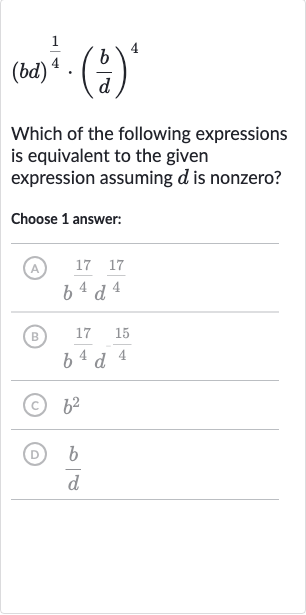Full solution
Q. Which of the following expressions is equivalent to the given expression assuming is nonzero?Choose answer:(A) (B) (C) (D)
- Simplify expression using exponents: Simplify the expression by applying the properties of exponents. can be rewritten as .
- Separate terms involving and : Separate the terms involving and .This gives us .
- Combine exponents for
b andd : Combine the exponents forb andd using the property of exponents that statesa^{m} \cdot a^{n} = a^{m+n} .\newline b , we haveb^{ .1 1 4 4 4 4 1 1 4 4 16 16 4 4 17 17 4 4 \newline d , we haved^{ .1 1 4 4 4 4 1 1 4 4 16 16 4 4 − 15 -15 4 4 - Write final expression: Write the final expression.
\newline b 17 4 ⋅ d − 15 4 b^{\frac{17}{4}} \cdot d^{-\frac{15}{4}}
More problems from Compare linear and exponential growth
QuestionGet tutor help
QuestionGet tutor help
QuestionGet tutor help
QuestionGet tutor help
QuestionGet tutor help
QuestionGet tutor help
QuestionGet tutor help
QuestionGet tutor help
QuestionGet tutor help
QuestionGet tutor help

